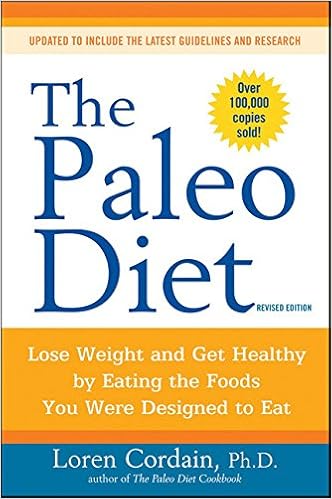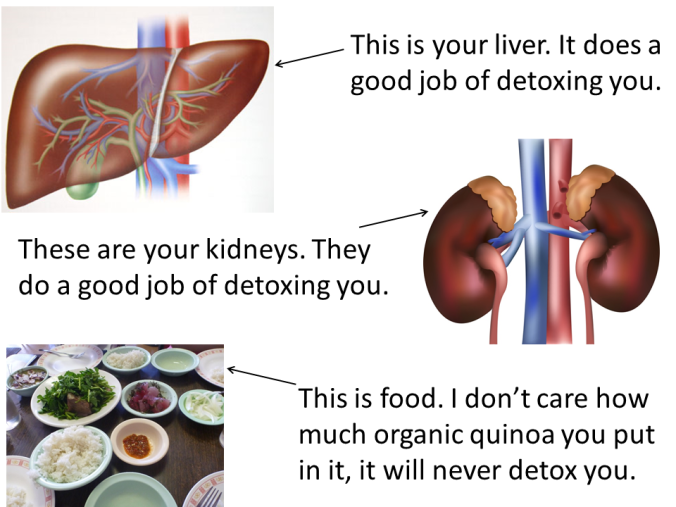There's a diet for the management of any and every disease, for weight loss, and even a diet for returning to caveman ways of eating. Today more than ever, we're encouraged to eat healthy.
So we eat healthy and what happens? A new eating disorder pops up, and worse, it's based around eating healthy. In fact, it's based around eating extremely healthfully. How can we win?
Having recently begun my transition to an alkaline diet, I can see that I need to be careful. My motivations for wanting to eat healthy and "clean" are harmless enough, but with the diligence I've had regarding my decidedly new ways of consuming, I can understand how a perfect diet can become an obsession.
A diet consisting of no sugar, processed or chemically altered foods, a high chlorophyll content and an overall higher pH level has proven to be not only energy providing, but surprisingly tasty. I'm constantly shocked at how delicious recipes with two or three simple ingredients can make me swoon. The discipline required however, has proven to be quite tough and I've felt guilty when I "slip." I have to constantly remind myself I'm TRANSITIONING.
I'm allowing myself time to replace familiar food choices and re-learn ways of eating and cooking, as opposed to trying to change all my eating habits overnight.
Because of this, my dietary goals aren't a prison. Sometimes they feel like it, I can't lie, lol. Sugar is acid, period. That's been a tough one for me. I'm slowly retraining my taste buds to find the sweetness in certain vegetables.
But I LOVE dessert! We've become great friends over the years.
Orthorexia Nervosa like any eating disorder, is an outgrowth of trying to be perfect. In this case, it's attempting to achieve the perfect diet, both in food choice and food quality.
As with anything, being kind and patient with ourselves is vital when making life improvements.
If not, even eating healthy can become unhealthy.
If one isn't careful, it could become deadly.
WTS.
Orthorexia Nervosa other wise known as Orthorexia, is a term which literally means “fixation on righteous eating.”
Orthorexia starts out as an innocent attempt to eat more healthfully, but orthorexics become fixated on food quality and purity. They become consumed with what and how much to eat, and how to deal with “slip-ups.” An iron-clad will is needed to maintain this rigid eating style. Every day is a chance to eat right, be “good,” rise above others in dietary prowess, and self-punish if temptation wins (usually through stricter eating, fasts and exercise).
Self-esteem becomes wrapped up in the purity of diet and they sometimes feel superior to others, especially in regard to food intake.
Eventually food choices become so restrictive, in both variety and calories, that health suffers – an ironic twist for a person so completely dedicated to healthy eating. Eventually, the obsession with healthy eating can crowd out other activities and interests, impair relationships, and become physically dangerous.
Is Orthorexia An Eating Disorder?
Orthorexia is a term coined by Steven Bratman, MD in 1996. He began to use it with his patients who were overly health-obsessed. Today, he has created an official scientific definition for the disease and is working on getting it published and accepted by the medical community. However, Dr. Bratman was not the one to bring orthorexia to the mainstream some year and a half ago. Jordan Younger, a 25-year-old lifestyle blogger from California,was.
Younger was a devout raw vegan who had built an online following of tens of thousands by writing about her virtuous veganism on her then-blog The Blonde Vegan. To Younger, veganism was the cure-all she was hoping for—no longer did she suffer from chronic indigestion or feelings of bloating and discomfort. As she preached about the benefits of a plant-based diet alongside photos of bright green smoothies, mason jars brimming with chia seeds, and chopped kale salads, the popularity of her vegan persona grew.
Soon vegan cleanse companies sought her out to try their pricey cleanses for free. Younger started cleansing religiously—for a minimum of three days a week, eventually finding that every time she finished a cleanse and reintroduced solid food, her stomach problems returned. Younger was still resolute in turning to vegan cleanses as the answer.
Orthorexia is a term coined by Steven Bratman, MD in 1996. He began to use it with his patients who were overly health-obsessed. Today, he has created an official scientific definition for the disease and is working on getting it published and accepted by the medical community. However, Dr. Bratman was not the one to bring orthorexia to the mainstream some year and a half ago. Jordan Younger, a 25-year-old lifestyle blogger from California,was.
Younger was a devout raw vegan who had built an online following of tens of thousands by writing about her virtuous veganism on her then-blog The Blonde Vegan. To Younger, veganism was the cure-all she was hoping for—no longer did she suffer from chronic indigestion or feelings of bloating and discomfort. As she preached about the benefits of a plant-based diet alongside photos of bright green smoothies, mason jars brimming with chia seeds, and chopped kale salads, the popularity of her vegan persona grew.
Soon vegan cleanse companies sought her out to try their pricey cleanses for free. Younger started cleansing religiously—for a minimum of three days a week, eventually finding that every time she finished a cleanse and reintroduced solid food, her stomach problems returned. Younger was still resolute in turning to vegan cleanses as the answer.
Soon the cycle of cleansing, getting too hungry, binging on solid food, feeling guilty, and cleansing again became the norm. Instead of looking outside of veganism to feel better, Younger started fearing vegan foods weren't as healthy as she'd like them to be, and became riddled with anxiety about the food she ate.
Eventually, Younger came to understand that she had a problem. Hers wasn't a classic eating disorder people were familiar with; hers was a fixation on the virtue of food. She introduced the term orthorexia to her following, saying that she was suffering and was going to get help. The response she got was overwhelming: "Once I started talking about experience with orthorexia on my blog, national news picked up on it. A flood of people then came forward saying they identified with me."
"People have died of orthorexia because they haven't been properly diagnosed," according to Nutritional therapist Dr. Karin Kratina, who has specialized in treating eating disorders for over 30 years. "I have absolutely seen a rise in orthorexic patients, and it's rising exponentially. Now I get a new client every week with orthorexic symptoms. It is more serious then people realize."
One of the reasons Dr. Kratina believes orthorexia is rising in popularity is because of our fixation on health. "There is nothing wrong with eating local or being a vegetarian or vegan and a lot of those diets are valuable. The problem is food has become presented—more and more—as the answer."
How Do You Know If You Have Orthorexia
Consider the following questions. The more questions you respond “yes” to, the more likely you are dealing with orthorexia. I have filled in my own answers as well.
Do you wish that occasionally you could just eat and not worry about food quality? - More like eat w/o weight gain.
Do you ever wish you could spend less time on food and more time living and loving?
Does it seem beyond your ability to eat a meal prepared with love by someone else – one single meal – and not try to control what is served?
Are you constantly looking for ways foods are unhealthy for you? The opposite actually
Do love, joy, play and creativity take a back seat to following the perfect diet?
Do you feel guilt or self-loathing when you stray from your diet? -YES.
Do you feel in control when you stick to the “correct” diet? - YES.
Have you put yourself on a nutritional pedestal and wonder how others can possibly eat the foods they eat? Sure do!
What Is The Treatment for Orthorexia?
Society pushes healthy eating and thinness, so it is easy for many to not realize how problematic this behavior can be. Even more difficult is that the person doing the healthy eating can hide behind the thought that they are simply eating well (and that others are not). Further complicating treatment is the fact that motivation behind orthorexia is multi-faceted. First, the orthorexic must admit there is a problem, then identify what caused the obsession. She or he must also become more flexible and less dogmatic about eating. Working through underlying emotional issues will make the transition to normal eating easier.
Recovery
A practitioner skilled at treating eating disorders is the best choice. Recovered orthorexics will still eat healthy, but with a different understanding of what healthy eating is. They'll realize that food will not make them a better person and that basing their self-esteem on the quality of their diet is irrational. They'll find that while food is important, it is one small aspect of life, and that often other things are more important!
As always, follow the blog! Create a username and follow so you will always know when there's a new post, updates, news, etc. Look to your right ---->, it's easy. :)
Source 1
Source 2
Source 3
Consider the following questions. The more questions you respond “yes” to, the more likely you are dealing with orthorexia. I have filled in my own answers as well.
Do you wish that occasionally you could just eat and not worry about food quality? - More like eat w/o weight gain.
Do you ever wish you could spend less time on food and more time living and loving?
Does it seem beyond your ability to eat a meal prepared with love by someone else – one single meal – and not try to control what is served?
Are you constantly looking for ways foods are unhealthy for you? The opposite actually
Do love, joy, play and creativity take a back seat to following the perfect diet?
Do you feel guilt or self-loathing when you stray from your diet? -YES.
Do you feel in control when you stick to the “correct” diet? - YES.
Have you put yourself on a nutritional pedestal and wonder how others can possibly eat the foods they eat? Sure do!
What Is The Treatment for Orthorexia?
Society pushes healthy eating and thinness, so it is easy for many to not realize how problematic this behavior can be. Even more difficult is that the person doing the healthy eating can hide behind the thought that they are simply eating well (and that others are not). Further complicating treatment is the fact that motivation behind orthorexia is multi-faceted. First, the orthorexic must admit there is a problem, then identify what caused the obsession. She or he must also become more flexible and less dogmatic about eating. Working through underlying emotional issues will make the transition to normal eating easier.
Recovery
A practitioner skilled at treating eating disorders is the best choice. Recovered orthorexics will still eat healthy, but with a different understanding of what healthy eating is. They'll realize that food will not make them a better person and that basing their self-esteem on the quality of their diet is irrational. They'll find that while food is important, it is one small aspect of life, and that often other things are more important!
As always, follow the blog! Create a username and follow so you will always know when there's a new post, updates, news, etc. Look to your right ---->, it's easy. :)
Source 1
Source 2
Source 3








No comments:
Post a Comment